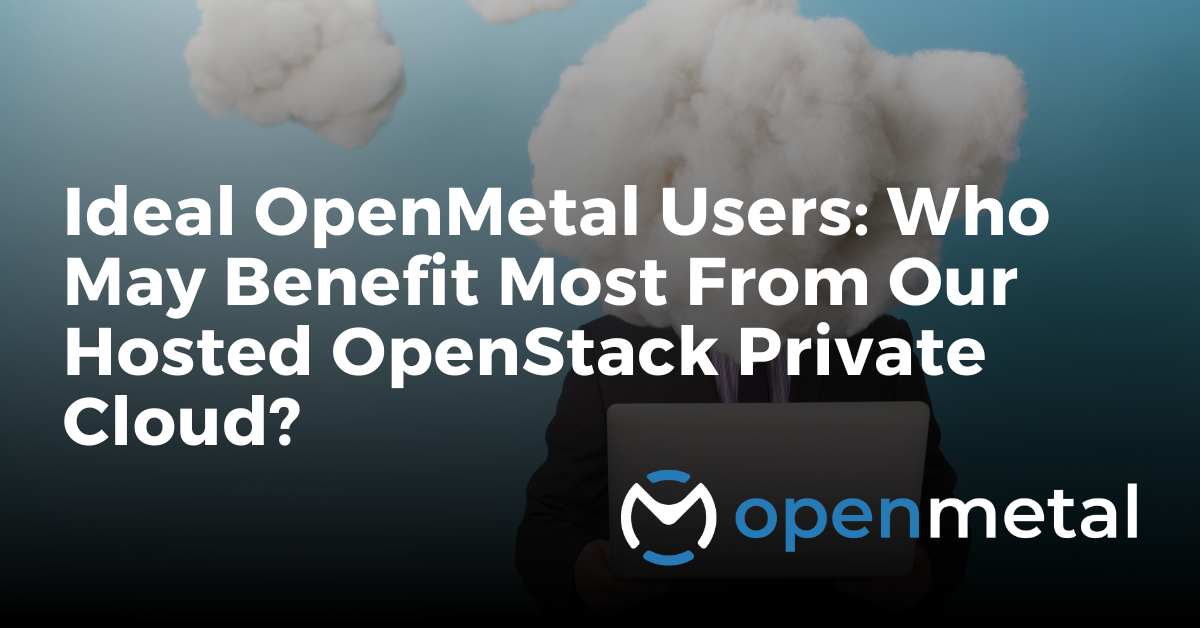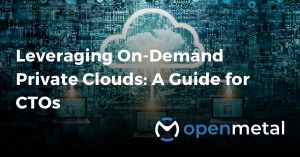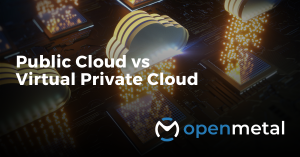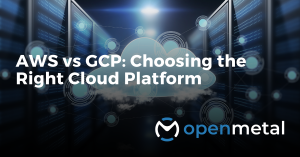
In this article
- Sensitivity to infrastructure costs
- Flexibility of the platform and root access
- Regulated industries with data security requirements
- Big public cloud provider concerns and competition
- Outgrowing their cloud
- Big public cloud provider concerns and competition (engineer’s view)
- Giving smaller businesses enterprise tools
In this video and accompanying article OpenMetal President, Todd Robinson, discusses who we believe may benefit most from OpenMetal on-demand private clouds.
The below article is a transcription of the video content, edited minimally for clarity.
Ideal OpenMetal Users and Use Cases
A question that comes up often is “do we have an ideal customer for this?” Well, I wouldn’t pretend to know how everybody is thinking about it! But many people are driven to this for a lot of reasons. Maybe they love open source, maybe they’re tired of getting a huge bill from Amazon, maybe they’re tired of not having access to tweak things that they want.
Sensitivity to infrastructure costs
Definitely a commonality that’s coming up is if your business is very sensitive to your infrastructure costs – SaaS companies are a great example of that – your bottom line can dramatically shift if you look at a solution that has much better economics. The example in this case is that for some workloads, you might drop 50-60% of the expense by switching over to an on-demand private cloud. And that’s very meaningful to a lot of SaaS companies that say “Wow! I’m basically going to get to float another 10-15% to my bottom line. Imagine what I could do with that. I could get more people, I can pay my people better, I can move faster, I could put those dollars in so many different places instead of putting them into a big public cloud’s pocket.”
Flexibility of the platform and root access
So certainly, there are driving forces behind it. Saving dollars is a major one for customers. Certainly, flexibility of the platform itself.
Because it is a private cloud, you have root access to it so you can actually make modifications to the system to have your hardware more accurately suit your workload. So maybe it’s modifications on the storage type, maybe for certain workloads you want to have highly-available disk and you want to be able to trust that whatever you have written there is going to be there, and so you need a highly-available system that’s going to be distributed across multiple machines. But that typically has an I/O penalty. And so for applications, a lot of test applications where you need to produce a lot of data, validate the data and then get rid of it, you don’t need HA. You’re going to want direct access to the drives because it’s much faster to do that. So you’ll see use cases that are “I need access to the hardware specifically so that I can tune the settings of the cloud to my workload.”
Those are two big use cases – one, can I save some dollars? Which inevitably, yes you absolutely can. Two, can I modify my cloud to suit my workload?
Regulated industries with data security requirements
We also see the classic stuff come in like “where’s my data?” There are definitely more regulated industries that are very specific about where that information is, is it encrypted, is it within my control, is it in my own private cloud?
Big public cloud provider concerns and competition
A fourth one that we’ve actually seen come up is that companies can often be concerned who they’re buying from. And it can be for multiple reasons. One is it could be that you’re buying from a competitor.
The other day I saw this announcement from Best Buy (who I think is a great company) that they were excited that they were moving a big workload over to Amazon. I thought okay, that’s interesting, I wonder why they did that. And it just happened that same day I got a feed about Amazon’s earnings. Amazon had come out and said they’re very excited that AWS – the division of Amazon that Best Buy is buying from – is massively profitable and doing very well. And they also said our store is losing money. So the Amazon store, the typical one that most people interact with, actually in that period that they’re reporting was losing money and being subsidized by AWS, the division that Best Buy was buying from! So it just entered into my mind that this is important for people and for companies to understand that you might actually be buying from a competitor and that Best Buy example is very stark. You’re buying literally from a competitor, subsidizing a business that is competing against you.
So, a very good reason for people to look at a private cloud or look at this technology. I’m not saying that Best Buy is a great fit for our cloud yet (maybe someday!) but that the idea and the concept is valid across many of these companies. You really should understand the vendor that you’re buying from whether the vendor has your best interests at heart. In this case, it clearly would not.
Outgrowing their cloud
For me, the ideal customer for OpenMetal is someone who started out on the cloud, and they grew on the cloud, but they’re starting to feel like the cloud’s not a good fit. It can be in a lot of different ways that the cloud isn’t a good fit.
Maybe your cost structure isn’t working and you’re having to spend 50-60% of every single unit you sell on the cloud. And as you grow you’re going to get closer to failing because you’re going to burn through all your cash, because you can’t make enough money because the cloud is too expensive.
Big public cloud provider concerns and competition (engineer’s view)
There’s also people who are just concerned about some of the decisions the big cloud companies are making and how they’re really unaccountable to their customers. And if you think about it, some of those big providers, their web service isn’t for you. It’s not for their consumers, it’s for powering some other storefront or service that they operate that’s their main line of business. How can you know they have your best interest at heart if you’re just subsidizing their main business line that isn’t lined up with yours?
Some people may be concerned about competing against their cloud provider. I know some of these big companies have shown that they’re willing to snoop on their partners’ data and the activity of their third party sellers and other people who use their platform to inform their own product strategy.
And sometimes they’ll come into your vertical and they’ll take it from you if you don’t sell to them under very aggressive terms. It’s not a good place when you’re trying to grow your company and you have to keep looking over your shoulder because your hosting provider may come looking for you one day.
I also think though that people often realize the cloud, those big cloud platforms, they’re one-size-fits-all so they don’t fit anybody really well. If you try putting on a one-size-fits-all hat, very few people find it a perfect fit.
Giving smaller businesses enterprise tools
So for me, OpenMetal gives companies a chance to do the things that enterprises do to be competitive.
They can build their own infrastructure that’s customized to meet their own needs.
They can have their own privacy and security, and have their independence to stake out a path for their own freedom, unbeholden to their big cloud provider.
And really, for me, that’s the big benefit for OpenMetal is for cloud users that they can do these kinds of things. They can have their cloud independence and have a much better cost structure. There’s a reason why Walmart and these other Fortune 100 companies do these kinds of things, why they build their own clouds. It’s because it works, it’s the most cost effective. But until now, until OpenMetal launched its platform, there wasn’t a way to do that at a smaller team’s budget or size. Now there is!
More From OpenMetal…

Leveraging On-Demand Private Clouds: A Guide for CTOs
Explore this comprehensive guide on how Chief Technology Officers (CTOs) and technical executives can harness the power of on-demand private clouds for their organizations. In this blog post, we’ll explore the insights about the benefits and strategies of leveraging on-demand …. Read More

Public Cloud vs Virtual Private Cloud
In short, a VPC or Virtual Private Cloud is not remotely equal to a private cloud. In fact, a true private cloud slices up its resources into hundreds or even thousands of Virtual Private Clouds.
I would say an apple versus an orange comparison or maybe more like an apple versus tiny… Learn More

AWS vs GCP: Choosing The Right Cloud Platform
AWS and GCP are leading players in cloud computing, offering a wide range of services and attractive pricing. However, choosing the right platform requires understanding their strengths, customer pain points, and alternatives. Comparing and shopping around for … Read More
Test Drive
For eligible organizations, individuals, and Open Source Partners, Private Cloud Cores are free to trial. Apply today to qualify.
Subscribe
Join our community! Subscribe to our newsletter to get the latest company news, product releases, updates from partners, and more.



































